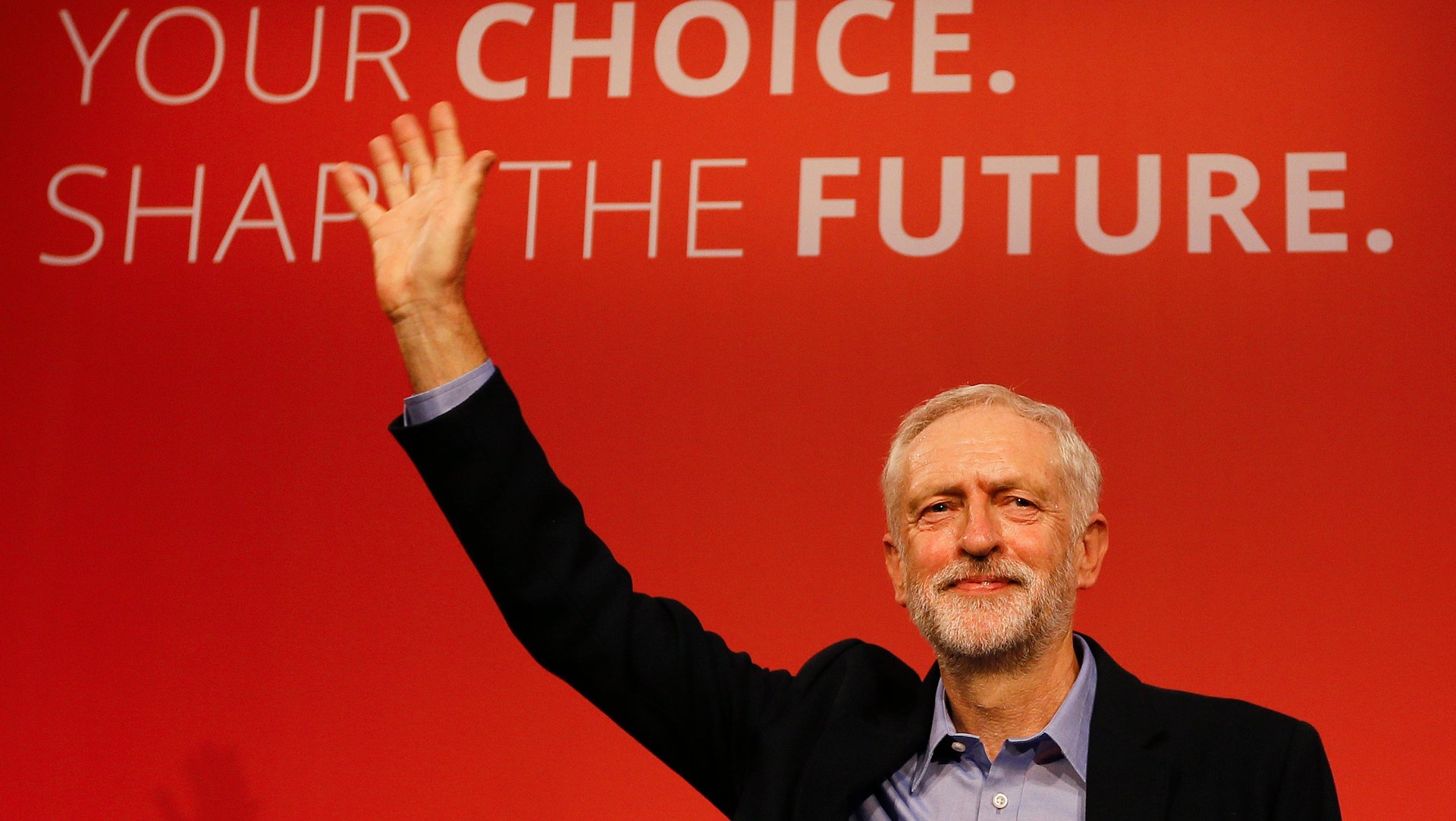Jeremy Corbyn’s win is the product of a UK Labour party gamble for “authenticity”
At university I hated Margaret Thatcher, though she was no longer even prime minister then. I never understood my hate. She took away our school milk, earning her the accolade “Thatcher the Milk Snatcher,” but at the rebellious age of seven I often got in trouble for throwing my milk in the sink—so Thatcher had actually done me a favor.


At university I hated Margaret Thatcher, though she was no longer even prime minister then. I never understood my hate. She took away our school milk, earning her the accolade “Thatcher the Milk Snatcher,” but at the rebellious age of seven I often got in trouble for throwing my milk in the sink—so Thatcher had actually done me a favor.
It was just intellectually fashionable, back then, to be politically left. The Young Conservatives at medical school were a strange lot who performed dodgy rituals involving lots of gin and vodka.
Ostensibly, I supported the Labour party. This was mostly because my parents supported them. I was told that India won independence from a Labour government. My support for Labour was a kind of brown man’s burden.
But then, during the 1992 elections, something dramatic happened. I voted for John Major—the leader of the Conservative party—not Neil Kinnock, the Labour leader. I don’t know how that happened. Up until two seconds before casting my vote, I wanted to vote for Kinnock. Don’t get me wrong—it was volitional. I wasn’t under the influence of drugs, legal or illegal. In a brief moment of clarity, which lasted about 100 milliseconds, I felt Britain would be better off under Major.
I was suffering from Shy Tory Syndrome (STS). This is a condition in which one confesses neither in public nor in private that they will vote for the Conservative party. An unknown number of the electorate has STS. It’s a pesky condition which confounds pollsters and makes a mockery of television pundits, as it did in the last election, when Labour was trounced.
I was an odd exemplar of Shy Tory Syndrome. I am neither shy nor, in any conventional sense, a Tory. I don’t wear a top hat. I don’t watch horses racing in Ascot. And I don’t really wish to conserve anything, not even Scotland.
But neither was I a man of the Labour party. I had confused my gratitude for the party’s historical legacy with unconditional love. It was a deep psychosis. As Kinnock was getting pummeled at the exit polls, I felt bad for him and I hoped he would win. In the end I was relieved that Kinnock lost by more than one vote—otherwise I might not have forgiven myself.
Shy Tory Syndrome is a consequence of two factors: that Labour is reasonable, if a tad unrealistic, and that Conservatives are realistic, if a tad—just a tad—unreasonable. It’s the cognitive dissonance when realism collides gently with idealism. STS occurs because neither party transgresses wildly off-center. You could imagine living happily ever after under either a Labour or Conservative government.
If either party has an extreme leader, STS disappears. The dissonance is between center left and center right—a clash of two moderates. No dissonance is induced between far left and center right, or vice versa.
The new leader of the Labour party, Jeremy Corbyn, may cure Britain of STS. He is a proud man of the far left. This is the left which lost elections when Britain was center-left 30 years ago. Britain is now center-right.
The political spectrum is relative, though. The far left in Britain is really left. I mean really, really left—trade unions, nuclear disarmament, and nationalization of convenience stores. Obama’s policies would be considered a tad too right in the UK today. Bernie Sanders would make a good leader of the Labour party. Donald Trump would have a shot at the Monster Raving Looney Party, so long as he confesses to satire.
Why has a radical like Corbyn been elected Labour leader?
The Labour party has made the same mistake the Republicans made after losing in 2008. They confused the want of moderation for a want of authenticity—“we lost because we were not true enough to our core principles.” This is a classic error which leads to more error and less electability. After the loss, the party looks to its base for support. A reliable way to whip up support is to appeal to the raw emotions of its loyal supporters. This further drives away the already disinclined moderates.
Corbyn’s virtue is his honesty. There are, as Quartz has previously noted, parallels with Donald Trump. Like Trump, Corbyn means what he says, says a lot, and says much which is patently nonsense. Honesty may be his downfall and the downfall of the Labour party.
Even in opposition, Labour shaped the Conservatives, bringing them closer to the center. A strong opposition is important for a healthy democracy. In politics it is no fun seeing a clown vanquished. Britain is not as polarized as the US but may become so. Shy Tory Syndrome has been a balancing factor.
I prefer to suffer Shy Tory Syndrome. With Corbyn in opposition, supporting Labour, even ostensibly, will no longer be a badge of intellectualism. It will, instead, be lampooned as reactionary anachronism. This is a terrible legacy for the party which gave India its independence, and introduced universal healthcare in Britain.